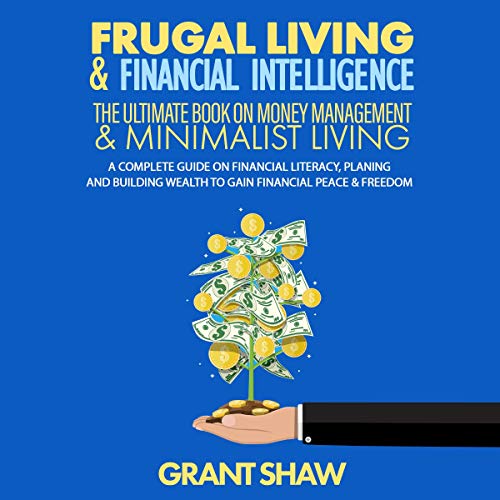Are you ready to take charge of your financial future and start living a more frugal lifestyle? Look no further than “Financial Literacy 101: Building the Foundation of Frugal Living.” This insightful article will equip you with the essential knowledge and skills needed to navigate the often complex world of personal finance. Discover the key principles of financial literacy and learn how they can empower you to make informed decisions, save money, and achieve your long-term goals. Get ready to embark on a journey towards financial independence and discover the benefits of living a frugal life.
Importance of Financial Literacy
Financial literacy is the cornerstone of managing your personal finances effectively. It refers to the understanding and knowledge of various financial concepts and the ability to apply them to make informed decisions about your money. Being financially literate empowers you to take control of your financial future, make sound financial choices, and achieve financial independence.
Understanding the concept of financial literacy
Financial literacy encompasses a range of knowledge and skills relating to money management. It involves understanding key financial concepts, such as budgeting, saving, investing, debt management, and credit. It also involves developing the mindset and habits necessary for frugal living, which ultimately lead to financial stability and well-being.
Benefits of being financially literate
Being financially literate offers numerous advantages. It enables you to effectively manage your money, avoid debt and financial pitfalls, and make wise investment decisions. Financial literacy is essential for setting and achieving financial goals, such as saving for retirement, buying a home, or starting a business. It also enhances your ability to withstand financial emergencies and adapt to unexpected circumstances, providing you with a sense of security and peace of mind.
Impact on frugal living
Financial literacy and frugal living go hand in hand. Frugality is the practice of living a simple and economical lifestyle, making mindful spending decisions, and prioritizing long-term financial goals over short-term desires. Being financially literate equips you with the knowledge and skills to make frugal choices, effectively manage your resources, and live below your means. This, in turn, allows you to save money, reduce debt, and build wealth over time.
Basic Money Management Skills
To achieve financial literacy and embrace frugal living, it is crucial to develop essential money management skills. These skills serve as the foundation for your financial well-being and enable you to make sound financial decisions. Let’s explore some of the key money management skills you should develop.
Budgeting
Budgeting is the process of creating a plan for your income and expenses. It involves listing all your sources of income and tracking and categorizing your expenses. By budgeting, you gain a clear understanding of where your money is going, identify areas where you can cut back, and allocate funds towards your financial goals. Budgeting helps you live within your means, avoid overspending, and stay on track financially.
Tracking expenses
Tracking your expenses is essential for effective money management. It involves recording and categorizing all your expenditures, from daily expenses to monthly bills. Tracking your expenses helps you identify spending patterns, pinpoint areas where you may be overspending, and make necessary adjustments to your budget. By keeping track of your expenses, you become more aware of your financial habits and can make informed decisions about your spending.
Saving and investing
Saving and investing are vital components of building wealth and achieving financial security. Saving involves setting aside a portion of your income for future use, whether it be for emergencies, large purchases, or retirement. Savvy savers prioritize saving and make it a regular habit. Investing, on the other hand, involves putting your money to work to generate returns over time. It is important to understand different investment options and the associated risks and rewards to make informed investment decisions.
Debt management
Debt management is crucial for maintaining financial health. It involves responsibly managing borrowed money, such as loans or credit card balances. Understanding the impact of debt on your financial well-being is essential. Developing a plan to repay debt, minimizing interest payments, and avoiding unnecessary debt are all part of effective debt management. By effectively managing your debt, you can reduce financial stress and improve your overall financial situation.

Developing a Frugal Mindset
A frugal mindset is a key component of financial literacy and successful frugal living. It is about adopting a mindset that prioritizes long-term financial goals, values simplicity and minimalism, and makes deliberate choices about spending and consumption.
Understanding frugality
Frugality is often misunderstood as being cheap or stingy. However, true frugality is about living a purposeful, intentional, and resourceful life. It means being mindful of your spending, making conscious choices about what you truly need, and finding value in experiences and relationships rather than material possessions. Understanding the true essence of frugality is essential for cultivating a frugal mindset.
Differentiating between needs and wants
A frugal mindset involves being able to differentiate between needs and wants. Needs are essential for survival and well-being, such as food, shelter, healthcare, and education. Wants, on the other hand, are desires that are not necessary for basic survival. By understanding the difference between needs and wants, you can prioritize spending on necessities and reduce unnecessary expenses.
Mindful spending habits
Mindful spending is a core principle of frugal living. It involves being intentional and conscious about how and where you spend your money. By practicing mindful spending, you can avoid impulsive purchases, evaluate the value and necessity of each expense, and make informed choices that align with your financial goals. Mindful spending also encourages you to seek alternative, cost-effective solutions and prioritize experiences over material possessions.
Embracing minimalism
Minimalism is closely tied to frugal living and financial literacy. It is about simplifying your life by reducing clutter, possessions, and excessive consumption. Embracing minimalism encourages you to focus on what truly matters, eliminate unnecessary expenses, and prioritize experiences and relationships over material possessions. By embracing minimalism, you can free up financial resources, reduce financial stress, and find joy in living with less.
Understanding Income and Expenses
To effectively manage your finances and make frugal choices, it is important to understand your income and expenses. By analyzing your financial inflows and outflows, you can gain insights into your spending habits and make informed financial decisions.
Identifying sources of income
Start by identifying and understanding all the sources of income you have. This may include salary and wages, investment returns, side hustles, and any other monetary inflows. By having a clear picture of your income sources, you can plan and allocate funds strategically.
Evaluating fixed and variable expenses
Fixed expenses are the recurring expenses that remain relatively constant from month to month, such as rent or mortgage payments, insurance premiums, and loan repayments. Variable expenses, on the other hand, fluctuate based on usage or choice, such as groceries, entertainment, and discretionary spending. Evaluating both fixed and variable expenses helps you identify areas where you can potentially reduce costs and make frugal choices.
Analyzing spending patterns
Analyzing your spending patterns involves reviewing and categorizing your expenses to gain insights into your financial habits. This analysis allows you to identify areas of potential savings, eliminate unnecessary expenses, and redirect funds towards your financial goals. By understanding your spending patterns, you can make conscious choices that align with your frugal living objectives.
Creating an expense-to-income ratio
Calculating your expense-to-income ratio helps you determine the proportion of your income that goes towards expenses. By maintaining a healthy expense-to-income ratio, you ensure that you are living within your means and have enough funds to meet your financial obligations and savings goals. Monitoring and adjusting this ratio regularly is essential for sustaining a frugal lifestyle.

Creating and Sticking to a Budget
One of the most effective tools for financial literacy and frugal living is creating and sticking to a budget. A budget serves as your financial roadmap, guiding your spending decisions and helping you achieve your financial goals.
Setting financial goals
Before creating a budget, it is important to set clear financial goals. These goals could include saving for retirement, paying off debt, starting a business, or buying a home. By setting specific, measurable, achievable, relevant, and time-bound (SMART) goals, you give yourself a clear target to work towards.
Tracking income and expenses
To create an accurate budget, you need to track your income and expenses. This can be done through manual tracking using spreadsheets or by using apps or online tools that automate the process. By tracking your income and expenses, you can identify areas where you may be overspending, make necessary adjustments, and ensure that you have a realistic view of your financial situation.
Allocating funds for different categories
Once you have a clear picture of your income and expenses, it’s time to allocate funds to different categories. This includes essential expenses such as housing, transportation, and utilities, as well as discretionary spending categories like entertainment and dining out. Allocating funds ensures that you have a plan for every dollar you earn, leaving no room for wasteful spending.
Reviewing and adjusting budget
Creating a budget is not a one-time task. It requires regular monitoring and adjustments to ensure that it remains relevant and aligned with your evolving financial circumstances. Regularly reviewing your budget helps you identify areas where you may be overspending, adapt to changes in your income or expenses, and stay on track to achieve your financial goals.
Building an Emergency Fund
Regardless of your financial situation, building an emergency fund is crucial. An emergency fund is a stash of savings set aside to cover unexpected expenses or financial emergencies, such as medical bills, car repairs, or job loss. Having an emergency fund provides a safety net and protects you from relying on credit or going into debt when unexpected situations arise.
Importance of emergency funds
Life is full of unexpected surprises, and having an emergency fund ensures that you are financially prepared. It provides peace of mind, knowing that you have a cushion to fall back on in times of unexpected expenses or loss of income. An emergency fund helps prevent financial setbacks, reduces stress, and supports your overall financial well-being.
Determining the ideal fund size
The size of your emergency fund depends on several factors, such as your monthly expenses, income stability, and risk tolerance. Financial experts generally recommend having three to six months’ worth of living expenses saved in your emergency fund. However, your unique circumstances may require adjusting this guideline. Assess your needs and consider any specific risks or uncertainties you may face to determine the ideal fund size for you.
Strategies for saving emergency funds
Building an emergency fund requires discipline and consistent savings habits. Start by setting a specific savings goal for your emergency fund and determine how much you can realistically save each month. Automating your savings, setting up a separate account for your emergency fund, and cutting back on unnecessary expenses are effective strategies for saving towards your emergency fund. Over time, your emergency fund will grow, providing you with financial security and resilience.

Understanding Credit and Debt
Credit and debt play a significant role in financial literacy and frugal living. Understanding how credit works and how to manage debt responsibly is essential for maintaining a healthy financial life.
Explaining credit scores
A credit score is a numerical representation of your creditworthiness and indicates your ability to borrow money and repay it on time. Lenders use credit scores to assess the risk of lending to you. Understanding how credit scores are calculated, the factors that influence them, and how to improve your credit score are essential for accessing credit at favorable terms and rates.
Managing debt responsibly
Debt can be a useful tool when used responsibly, but it can also become a burden if mismanaged. Managing debt responsibly involves being aware of your borrowing capacity, borrowing only what you can afford to repay, and making timely payments. It also involves keeping your debt-to-income ratio in check and avoiding excessive debt that can negatively impact your financial well-being.
Minimizing interest payments
Interest payments can significantly impact your overall financial health. Minimizing interest payments involves paying off high-interest debt as quickly as possible, consolidating debt to lower interest rates, and negotiating better terms with lenders. By minimizing interest payments, you can reduce the cost of borrowing and free up funds for other financial goals.
Effect of debt on frugal living
Debt can hinder your ability to live frugally. Debt repayments tie up a portion of your income and limit your financial flexibility. Additionally, high levels of debt can lead to increased financial stress and limit your ability to save, invest, or make frugal choices. By understanding the relationship between debt and frugal living, you can make informed decisions about borrowing and prioritize debt repayment to maintain a frugal lifestyle.
Investing for Long-Term Financial Security
Investing is an essential component of financial literacy and frugal living. Investing can help you grow your wealth, build a nest egg for retirement, and achieve long-term financial security.
Importance of investing
Investing allows your money to work for you and generate returns over time. It provides an opportunity to grow your wealth, counter inflation, and build a more secure financial future. By starting early and investing consistently, you can harness the power of compounding and maximize the growth potential of your investments.
Different investment options
There are various investment options available, each with its own risk and return characteristics. Common investment options include stocks, bonds, mutual funds, exchange-traded funds (ETFs), real estate, and retirement accounts like 401(k)s or IRAs. Understanding the different investment options and their suitability to your financial goals and risk tolerance is essential for making informed investment decisions.
Understanding risks and rewards
Investing involves taking on certain risks in exchange for potential rewards. Different investment options carry varying levels of risk, from low-risk investments like government bonds to higher-risk investments like individual stocks. It is important to understand your risk tolerance and align your investments accordingly. Diversification, asset allocation, and staying informed about market trends are ways to mitigate risks while maximizing potential rewards.
Developing an investment strategy
Developing an investment strategy involves setting clear investment goals, establishing an asset allocation plan, and selecting suitable investment vehicles. Investing based on a strategy helps you maintain discipline, avoid emotional decision-making, and stay focused on your long-term financial objectives. Regularly reviewing and reevaluating your portfolio ensures that it remains aligned with your changing needs and risk tolerance.

Frugal Living Tips and Strategies
Frugal living encompasses various strategies and habits that help you make the most of your money, reduce waste, and prioritize what truly matters. Here are some frugal living tips and strategies to help you embrace a more economical lifestyle.
Cutting unnecessary expenses
Identify and eliminate unnecessary expenses that do not align with your financial goals. Evaluate your recurring subscriptions, impulse purchases, and discretionary spending. By cutting back on these non-essential expenses, you can free up funds for saving and investing, and live a more frugal life.
Comparison shopping
Before making a purchase, take the time to compare prices and options. Researching and comparing prices helps you find the best deals and avoid overpaying. Comparison shopping also encourages you to consider alternatives and make cost-effective choices.
Meal planning and cooking at home
Eating out can be expensive, and cooking at home is a frugal alternative. Plan your meals in advance, make grocery lists, and avoid food waste. By preparing meals at home, you not only save money but also have control over the quality and nutritional value of your meals.
Sustainable and eco-friendly choices
Frugal living often aligns with environmentally friendly practices. Opt for energy-efficient appliances, use public transportation or carpool, and reduce water and electricity consumption. By making sustainable choices, you not only save money but also contribute to a healthier planet.
Developing Healthy Money Habits
In addition to financial literacy and frugal living, developing healthy money habits is crucial for long-term financial success. Here are some habits to cultivate.
Prioritizing savings
Make saving a top priority. Automate your savings by setting up automatic transfers to a separate savings account or retirement account. Prioritizing savings over spending ensures that you consistently set aside funds for emergencies, financial goals, and retirement.
Automating savings
Automation is an effective way to save and invest consistently. Set up automatic contributions to your savings or investment accounts. By automating your savings, you remove the temptation to spend the money and make saving a part of your routine.
Avoiding impulsive buying
Impulsive buying can lead to unnecessary expenses and derail your frugal living efforts. Before making a purchase, take a moment to evaluate whether it aligns with your financial goals and needs. Avoid making impulsive purchases based on emotions or short-term desires.
Regular financial check-ups
Set aside time regularly to review and assess your financial situation. This includes reviewing your budget, tracking your expenses, evaluating your investments, and monitoring your progress towards your financial goals. Regular financial check-ups help you stay on track, identify areas for improvement, and make necessary adjustments.
In conclusion, financial literacy is the foundation of frugal living. Understanding key financial concepts, developing money management skills, and embracing a frugal mindset are essential for achieving financial independence and long-term financial well-being. By being financially literate, you will be able to make wise financial decisions, live within your means, and build a secure financial future. So embark on your journey to financial literacy and embrace the principles of frugal living – your future self will thank you.


